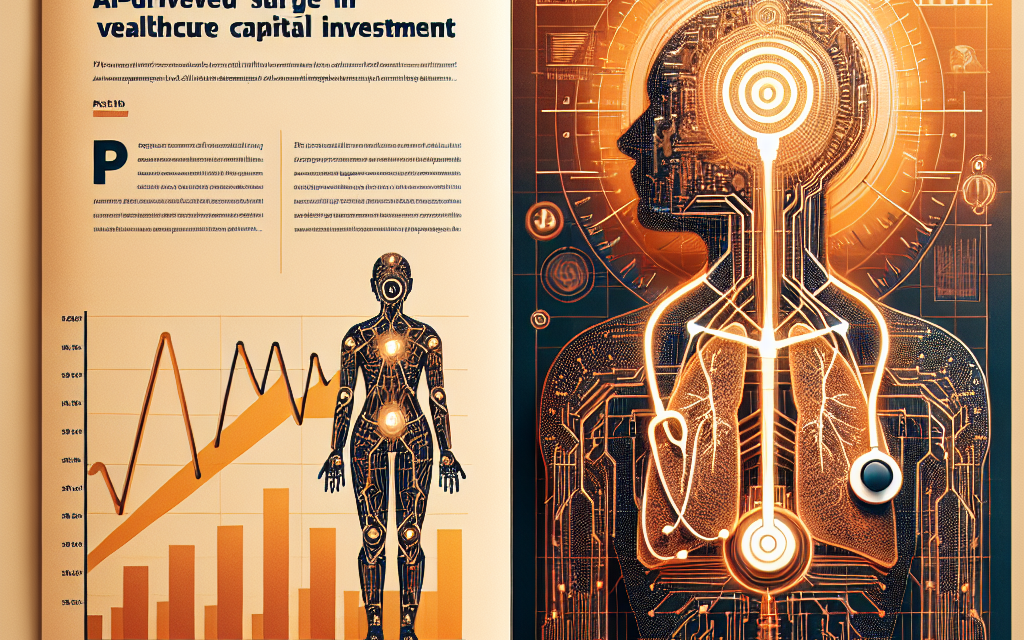AI-Driven Surge in Healthcare Venture Capital Investment in 2024: A Report
The healthcare sector is undergoing a transformative phase, driven by advancements in artificial intelligence (AI) and machine learning. As we step into 2024, the surge in venture capital investment in AI-driven healthcare startups is not just a trend; it is a paradigm shift that promises to redefine patient care, operational efficiency, and overall health outcomes. This report delves into the factors fueling this investment boom, the emerging technologies, and the implications for the healthcare landscape.
1. The Landscape of Healthcare Venture Capital in 2024
In 2024, the healthcare venture capital landscape is characterized by a significant increase in funding directed towards AI-driven solutions. According to a report by PitchBook, healthcare startups raised over $20 billion in venture capital in the first quarter of 2024 alone, with AI-focused companies accounting for nearly 40% of this total. This surge can be attributed to several factors:
- Increased Demand for Telehealth: The COVID-19 pandemic accelerated the adoption of telehealth services, creating a lasting demand for AI tools that enhance virtual care.
- Data-Driven Decision Making: Healthcare providers are increasingly relying on data analytics to inform clinical decisions, driving investment in AI technologies that can process vast amounts of data.
- Regulatory Support: Governments and regulatory bodies are recognizing the potential of AI in healthcare, leading to favorable policies that encourage innovation.
- Consumer Expectations: Patients are becoming more tech-savvy and expect personalized, efficient healthcare solutions, prompting startups to innovate.
- Cost Reduction: AI technologies promise to reduce operational costs, making them attractive to investors looking for scalable solutions.
As a result, venture capitalists are increasingly looking to invest in companies that leverage AI to solve pressing healthcare challenges. This trend is expected to continue throughout 2024 and beyond, as the healthcare industry embraces digital transformation.
2. Key Areas of Investment in AI-Driven Healthcare
Venture capital investment in AI-driven healthcare is not uniform; it is concentrated in several key areas that show promise for innovation and growth. These areas include:
- Diagnostic Tools: AI algorithms are being developed to assist in diagnosing diseases more accurately and quickly than traditional methods.
- Predictive Analytics: Startups are creating AI models that can predict patient outcomes, helping healthcare providers make informed decisions.
- Personalized Medicine: AI is enabling the development of tailored treatment plans based on individual patient data.
- Operational Efficiency: AI solutions are being implemented to streamline administrative tasks, reducing costs and improving patient care.
- Drug Discovery: AI is revolutionizing the drug discovery process, significantly reducing the time and cost associated with bringing new drugs to market.
Each of these areas presents unique opportunities for innovation and investment. For instance, companies like Tempus and Zebra Medical Vision are leveraging AI to enhance diagnostic accuracy, while others like BenevolentAI are focusing on drug discovery. The potential for AI to transform these sectors is immense, attracting significant venture capital interest.
3. Case Studies of Successful AI-Driven Healthcare Startups
To understand the impact of AI in healthcare, it is essential to examine successful startups that have attracted substantial venture capital investment. Here are a few notable examples:
- Tempus: Founded in 2015, Tempus uses AI to analyze clinical and molecular data to help physicians make data-driven decisions. The company raised $200 million in a Series G funding round in early 2024, bringing its total valuation to over $8 billion. Tempus’s platform has been instrumental in personalizing cancer treatment, showcasing the potential of AI in improving patient outcomes.
- GRAIL: GRAIL focuses on early cancer detection using advanced genomic sequencing and AI algorithms. The company raised $1.5 billion in funding, with significant investments from venture capital firms and pharmaceutical companies. GRAIL’s multi-cancer early detection test, Galleri, exemplifies how AI can revolutionize diagnostics.
- Babylon Health: This UK-based startup combines AI with telehealth services to provide patients with virtual consultations and health assessments. In 2024, Babylon raised $100 million to expand its services globally, demonstrating the growing demand for AI-driven telehealth solutions.
- PathAI: PathAI is focused on improving pathology diagnostics through AI-powered image analysis. The company secured $75 million in funding to enhance its platform, which helps pathologists make more accurate diagnoses, ultimately improving patient care.
- Freenome: Freenome is pioneering the use of AI in early cancer detection through blood tests. The company raised $300 million in 2024, highlighting the potential of AI to transform cancer screening and prevention.
These case studies illustrate the diverse applications of AI in healthcare and the significant venture capital interest in companies that are pushing the boundaries of innovation. As these startups continue to grow and evolve, they are likely to attract even more investment, further fueling the AI-driven healthcare revolution.
4. Challenges and Considerations in AI Healthcare Investments
While the surge in AI-driven healthcare investments presents numerous opportunities, it also comes with challenges that investors and startups must navigate. Some of the key challenges include:
- Data Privacy and Security: The healthcare sector is highly regulated, and startups must ensure that their AI solutions comply with data protection laws such as HIPAA in the United States. Failure to do so can result in significant legal repercussions.
- Integration with Existing Systems: Many healthcare providers still rely on legacy systems, making it challenging for AI solutions to integrate seamlessly. Startups must develop solutions that can work alongside existing technologies.
- Clinical Validation: AI algorithms must undergo rigorous clinical validation to ensure their accuracy and reliability. This process can be time-consuming and costly, potentially delaying product launches.
- Ethical Considerations: The use of AI in healthcare raises ethical questions, particularly regarding bias in algorithms and the potential for unequal access to care. Startups must address these concerns to build trust with patients and providers.
- Market Competition: The rapid growth of AI in healthcare has led to increased competition among startups. Investors must carefully evaluate which companies have a sustainable competitive advantage.
Addressing these challenges requires a collaborative approach between startups, healthcare providers, and regulatory bodies. By working together, stakeholders can create an environment that fosters innovation while ensuring patient safety and compliance with regulations.
5. The Future of AI in Healthcare: Trends and Predictions
As we look ahead to the future of AI in healthcare, several trends and predictions are emerging that will shape the industry in the coming years:
- Increased Personalization: AI will enable more personalized healthcare experiences, with tailored treatment plans based on individual patient data becoming the norm.
- Expansion of Telehealth: The telehealth market is expected to continue growing, with AI playing a crucial role in enhancing virtual consultations and remote monitoring.
- AI-Driven Drug Development: The drug discovery process will become increasingly efficient as AI algorithms analyze vast datasets to identify potential drug candidates.
- Integration of Wearable Technology: Wearable devices equipped with AI will provide real-time health monitoring, allowing for proactive interventions and improved patient outcomes.
- Focus on Health Equity: There will be a growing emphasis on using AI to address health disparities and ensure equitable access to care for all populations.
These trends indicate that AI will play a pivotal role in shaping the future of healthcare. As technology continues to evolve, it will be essential for stakeholders to remain adaptable and responsive to the changing landscape.
Conclusion
The surge in AI-driven healthcare venture capital investment in 2024 marks a significant turning point for the industry. With increased funding directed towards innovative startups, the potential for AI to transform patient care, operational efficiency, and overall health outcomes is immense. However, challenges such as data privacy, integration with existing systems, and ethical considerations must be addressed to ensure the responsible development and deployment of AI technologies.
As we move forward, the collaboration between startups, healthcare providers, and regulatory bodies will be crucial in fostering an environment that encourages innovation while prioritizing patient safety and equity. The future of healthcare is undoubtedly intertwined with AI, and those who embrace this transformation will be at the forefront of a new era in medicine.
In summary, the AI-driven surge in healthcare venture capital investment is not just a fleeting trend; it is a fundamental shift that will shape the future of healthcare for years to come. Stakeholders must remain vigilant and proactive in navigating the challenges and opportunities that lie ahead, ensuring that the benefits of AI are realized for all.





